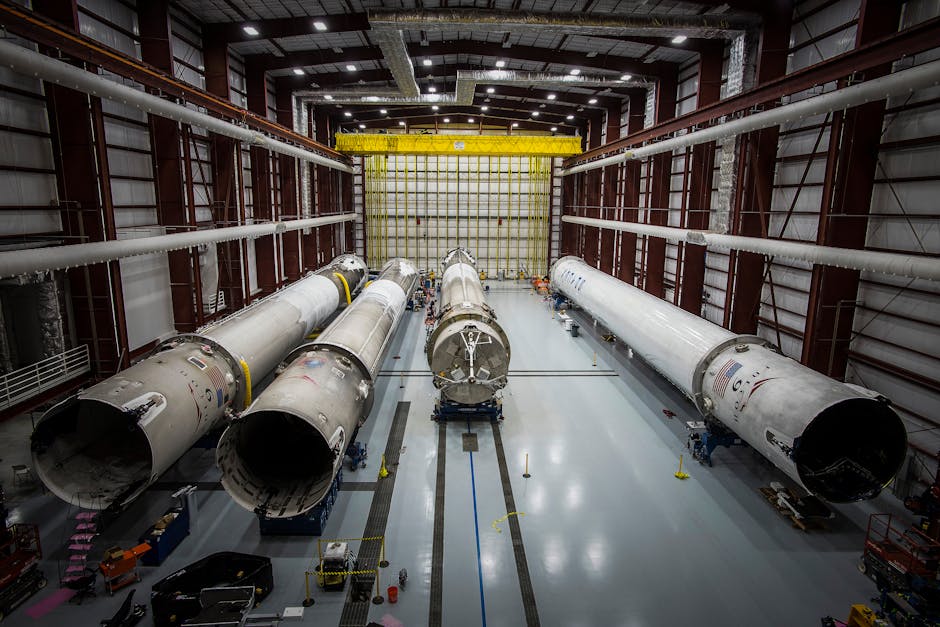Steel Forgings: Backbone of Heavy Industry in the UK
Steel forgings are the fundamental building blocks of heavy industry in the UK, playing a critical role in the manufacturing and infrastructure sectors. With a rich history deeply intertwined with the industrial evolution of the nation, steel forgings have become the cornerstone of numerous key industries, including automotive, aerospace, and construction.
Their exceptional strength, durability, and versatility have made them indispensable in the production of components and parts crucial for heavy machinery and structures.
This introduction aims to provide a comprehensive understanding of the pivotal role steel forgings play in the UK’s industrial landscape, exploring their historical significance, current applications, and future prospects in an ever-evolving industry.
Key Takeaways
- Steel forgings played a pivotal role in the Industrial Revolution, driving mass production and innovation in the UK.
- The advancements in metallurgy, CAD, and precision machining have significantly improved the quality and diversity of steel forgings.
- Steel forgings are crucial in the automotive industry due to their material strength, manufacturing efficiency, and contribution to safety and reliability of vehicles.
- In aerospace manufacturing, steel forgings are preferred for their exceptional strength, durability, resistance to extreme conditions, and reliability in aircraft components.
History of Steel Forgings in the UK

Throughout the industrial revolution and into the present day, the history of steel forgings in the UK has been characterised by continuous evolution, pioneering techniques, and remarkable technological advancements.
The industrial revolution marked a turning point, propelling the steel forging industry into a new era of mass production and innovative methods. This pivotal period saw the implementation of water and steam-powered hammers, significantly enhancing the efficiency and scale of production.
As time progressed, advancements in metallurgy, such as the Bessemer process and later the Linz-Donawitz process, revolutionised the quality and diversity of steel forgings. These breakthroughs enabled the production of stronger and more durable steel, opening the doors to a myriad of applications across various industries.
Today, modern techniques like computer-aided design (CAD) and simulation, coupled with precision machining, have further refined the manufacturing processes, allowing for intricate and custom steel forgings to meet the demands of diverse applications.
This rich history sets the stage for exploring the extensive applications of steel forgings in the automotive industry.
Applications in Automotive Industry

Steel forgings play a pivotal role in the automotive industry, providing essential components for vehicle manufacturing and assembly. The use of steel forgings in the automotive sector offers numerous benefits, including material strength, manufacturing efficiency, and cost-effectiveness.
-
Material Strength: Steel forgings are known for their exceptional strength and durability, making them ideal for critical automotive components such as engine parts, transmission systems, and steering mechanisms. The high strength-to-weight ratio of steel forgings contributes to the overall safety and reliability of vehicles.
-
Manufacturing Efficiency: Steel forgings allow for the production of complex shapes and intricate designs, enabling automotive manufacturers to create components with minimal machining requirements. This not only enhances manufacturing efficiency but also reduces material waste, resulting in cost savings and environmental benefits.
-
Cost-Effectiveness: While steel forgings offer superior material strength and manufacturing efficiency, they also provide a cost-effective solution for automotive manufacturers. The longevity and performance of steel forgings contribute to the overall value and longevity of the vehicles in which they are utilised.
The utilisation of steel forgings in the automotive industry underscores their significance in shaping the modern automotive landscape. Furthermore, their impact extends beyond automotive applications, playing a pivotal role in aerospace manufacturing.
Role in Aerospace Manufacturing

The integration of steel forgings in aerospace manufacturing underscores their versatile applicability across diverse heavy industries, including their critical role in enhancing the performance and reliability of aircraft components. In aerospace technology, the demand for materials with exceptional strength, durability, and resistance to extreme conditions is paramount. Steel forgings meet these requirements, making them indispensable in the aerospace sector. Their ability to withstand high stress and temperature variations, coupled with their excellent fatigue resistance, makes them ideal for critical aerospace applications. The following table highlights key material properties of steel forgings that make them well-suited for aerospace manufacturing:
| Material Properties | Advantages |
|---|---|
| High Strength | Ability to withstand high stress and load conditions |
| Excellent Fatigue Resistance | Resilience to repeated stress cycles and prolonged usage |
| Superior Durability | Capability to endure extreme temperature differentials and environmental factors |
The combination of these material properties contributes to the reliability and safety of aircraft components. As aerospace technology continues to advance, steel forgings remain a foundational element in ensuring the integrity and performance of critical aerospace systems.
Impact on Construction Sector

With its critical material properties, steel forgings play an essential role in ensuring the structural integrity and reliability of major construction projects across the UK.
The impact of steel forgings on the construction sector is profound, with several key contributions:
-
Structural Integrity: Steel forgings are crucial for providing the necessary strength and durability to support the construction of large-scale infrastructure such as bridges, skyscrapers, and industrial facilities. Their high tensile strength and resistance to fatigue make them an indispensable component in ensuring the stability and safety of these structures.
-
Economic Growth: The use of steel forgings in construction projects contributes to economic growth by facilitating the development of infrastructure and real estate. The efficiency and reliability of steel forgings help to reduce maintenance costs and enhance the longevity of construction projects, leading to sustainable economic benefits for the UK.
-
Innovation and Customisation: Steel forgings offer versatility in design and can be tailored to meet specific project requirements, allowing for innovative and customised solutions in construction. This adaptability contributes to the successful execution of diverse construction projects, further enhancing the overall impact of steel forgings on the construction sector.
Future Prospects and Innovations

Evidently, as heavy industry in the UK continues to evolve, the incorporation of advanced technologies into steel forging processes is becoming increasingly frequent. The future of steel forging is poised to witness a significant shift towards the integration of cutting-edge technologies and sustainability practises. Future technologies in steel forging are expected to focus on enhancing precision, efficiency, and environmental sustainability. Advanced simulation software will enable manufacturers to optimise forging processes, reducing material waste and energy consumption. Furthermore, the adoption of 3D printing in steel forging holds the potential to revolutionise the industry by allowing for intricate designs, rapid prototyping, and customisation.
| Future Technologies | Sustainability Practises |
|---|---|
| Advanced simulation software | Use of recycled steel |
| 3D printing | Energy-efficient forging processes |
| Artificial intelligence for process optimisation | Waste minimisation and recycling initiatives |
It is evident that the future of steel forging in the UK will be shaped by technological advancements aimed at improving efficiency and reducing environmental impact. The industry’s commitment to embracing sustainable practises will play a pivotal role in shaping the future landscape of steel forging.
Frequently Asked Questions
What Are the Environmental Impacts of Steel Forging in the UK and What Measures Are Being Taken to Mitigate Them?
Environmental sustainability is a critical concern in steel forging in the UK. Measures to mitigate its impacts include implementing energy-efficient technologies, exploring alternative materials, and investing in carbon capture and storage initiatives to reduce carbon emissions.
How Does the UK Steel Forging Industry Compare to Other Global Competitors in Terms of Technology and Innovation?
In the realm of global competitiveness, the UK steel forging industry stands out for its technological advancements. Its innovative approach and investment in cutting-edge technologies have positioned it as a formidable force in the international market.
What Are the Challenges Faced by the UK Steel Forging Industry in Terms of Workforce Skills and Training?
The UK steel forging industry faces challenges in workforce skills and training due to labour shortages. Recruitment strategies and investment in skill development are essential to address these issues, ensuring the industry’s competitiveness and sustainability.
How Does the UK Steel Forging Industry Contribute to the Country’s Overall Economic Growth and Stability?
The UK steel forging industry significantly bolsters economic growth and stability through its substantial contribution to manufacturing, infrastructure, and exports. Its pivotal role in heavy industry and supply chains makes it a cornerstone of the country’s economic resilience.
What Are the Potential Risks and Safety Considerations Associated With Steel Forging Operations in the Uk?
Potential risks associated with steel forging operations in the UK include high temperatures, heavy machinery, and handling of molten metal. Safety considerations involve proper training, protective gear, and adherence to strict protocols to mitigate accidents and ensure worker well-being.
Conclusion
In conclusion, steel forgings have been a critical component of heavy industry in the UK, playing a key role in the automotive, aerospace, and construction sectors.
The future prospects for steel forgings are promising, with ongoing innovations and advancements in technology.
For example, a case study of a major automotive manufacturer implementing advanced steel forging techniques to improve the strength and durability of their vehicle components demonstrates the potential for continued growth and development in this industry.
Contact us to discuss our services now!
